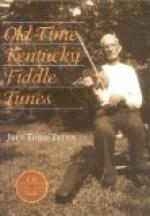Madge, understanding the desperation of their situation even better than he did, knowing, too, that a stranger could, indeed, scarce conceive the deadly peril of it, was, at first, the cooler of the two. Her life there in the mountains, where any man she knew might meet, and her own father had met, death stalking with a rifle in his bended elbow, or a knife clutched in his clenched hand, had given her a certain poise in time of peril, an admirable self-control, quick wits, firm nerves. She felt that there was small chance of escape, yet she was not visibly terrified, and made no outcry.
Had she been caught, thus, with a mountaineer (which scarcely could have happened) she would have felt small apprehension. Learned in the perils of the woods, heavy-booted, sturdy-legged, a native, like Joe Lorey, for example, would, she felt quite certain, have been able to effect her rescue. But the chances, she decided, were practically nil, with this untrained “foreigner” as her companion. She had been told that “bluegrass folks” were lacking in strong nerves and prone to panic if real danger threatened. Barefooted as she was, there was little she, herself, could do. She knew that she would quickly fall unconscious from intolerable pain if she so much as tried to make a dash for safety. That she was badly frightened she would have readily admitted, that she was panic-stricken none who looked at her could, for a moment, dream.
She glanced at Layson with a curiosity which was almost calm, as, for a moment quite bewildered, he ran from side to side of their rapidly narrowing space of safety, endeavoring to find a weak spot in the wall of flames through which they might escape, but failing everywhere. For a moment she thought that he had lost his head, and thus proved all too true those tales which she had heard of “foreigners.” It was almost as one race gazing at another suffering ordeal in test, that she observed his every movement, each detail of his facial play. While they had sat there on the log, intent upon their work above her spelling-book, she had wondered if the harsh, uncharitable mountain judgment of the “foreigners” had not been too merciless. Now she felt that she began to see its justification. The man, undoubtedly, she thought, showed an unmanly panic.
“No use tryin’ to get out that-a-way,” she said calmly. “You’d better—”




